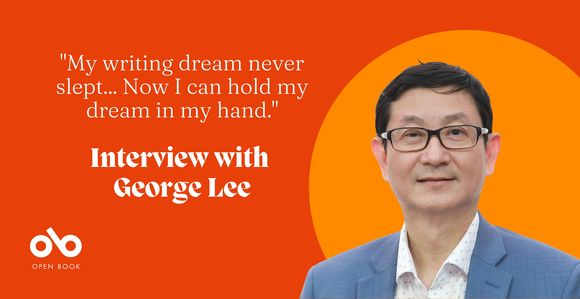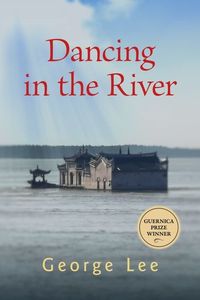George Lee on His Guernica Prize Winning Coming of Age Tale, Set Against the Cultural Revolution and Its Aftermath
In George Lee's Dancing in the River (Guernica Editions), Little Bright is only a child when China's Cultural Revolution upends his family and his life in a small, riverside town. As it wanes and China begins its long road to recovery, Little Bright undertakes something that would have been unthinkable just a few years earlier: learning English and adopting an English name, Victor. In college, he finds himself fascinated by the once-banned literature of the West: Sherlock Holmes, Shakespeare, and more. As his passion grows however, it sets him on a collision course between his new interests and his Chinese identity, in a country still reeling and finding its own new self.
Informed by Lee's own experiences, Dancing in the River is a global, epic tale of destiny told intimately and urgently with all the yearning of a young person discovering the world, and art, for the first time. A love letter to literature and many American and British greats, from Hemingway to Dickens, Dancing in the River, which won the 2021 Guernica Prize for Literary Fiction, is vivid and lush, and undoubtedly a coming of age story to remember; not only for its complex political backdrop but for its precise prose and searing honesty.
George speaks with us today as part of our Long Story interview series for novelists, telling us about his own experience as a young boy in China, how he came to the decision to write in his adopted second language, and the surprising role the writings of Carl Jung played in the novel's formation.
Open Book:
Do you remember how your first started this novel or the very first bit of writing you did for it?
George Lee:
This, indeed, is a long story.
I grew up in China with my maternal grandmother, a great storyteller. She often spoke parables to illustrate life lessons to be learned. Her uncanny stories sparked my curiosity. As a child, I toyed with my imagination, wondering what the other side of the sky looked like. When I began to read and write, I was mesmerized by the fictional world. I still recall what I said to myself in grammar school: “I want to be a writer when I grow up.”
I was not a fan of Chinese classics, to be honest. When China opened its doors to the West, I attended college and read English. I was charmed by the beauty of the language and the great works of Shakespeare, Charles Dickens, and the like. I was ushered into the realm of reasoning for the first time when I read the Stories of Sherlock Holmes.
After graduation, I decided to study English literature in Canada. Survival was my top priority. So, I attended law school and became a lawyer. But my writing dream never slept, and it kept knocking on the door of my heart until, one day, I told myself: “Enough! I’ll do it.” For a long time, I had been mentally plotting a coming-of-age story like David Copperfield. However, I struggled, for some time, with whether to write in my mother tongue or my adopted language, English. Finally, my heart convinced me to write in English. And my mind agreed.
It took me quite a few years from conception to completing my manuscript. Thanks to Guernica Editions, my manuscript won the 2021 Guernica Prize for Literary Fiction. Now I can hold my dream in my hand.
OB:
How did you choose the setting of your novel? What connection, if any, did you have to the setting when you began writing?
Your CanLit News
Subscribe to Open Book’s newsletter to get local book events, literary content, writing tips, and more in your inbox
GL:
As a novice writer, I started with my childhood experiences. That way, there is no burden for research. I can easily recall those familiar settings when I sit down and close my eyes. Then, my mind flashed back to the river, where I found myself laughing, playing, and shedding tears. However, interweaving life events into the plot became a great challenge. I found inspiration when I read Carl Jung, my favourite Swiss psychiatrist. Then, I recreated those casual events and imbued them with psychological meanings and metaphorical significance. I called it synchronicity (to borrow from Carl Jung) or literary karma, the logical consequence of the development of the plot.
For example, the invocation of the image of the ancient Chinese poet Qu Yuan is symbolic soul-searching, and the description of the present-day events in the book associated with the celebration of the Dragon Boat Festival implies the loss of the soul-searching tradition.
As in life, so in fiction. I have illustrated this point in the Prologue of Dancing in the River.
OB:
Did the ending of your novel change at all through your drafts? If so, how?
GL:
When I started my first draft, I thought of using the last chapter to reconcile the present with the protagonist’s past. But I did not expect that the whole concluding chapter would be imbued with mediative reflections.
Surprisingly, Dancing in the River ends in Chapter 36. Number 36 coincides with the last strategy in the Thirty-Six Stratagems, a famous Chinese essay comparable to Sun Tzu’s The Art of War. Those numbers in the Thirty-Six Stratagems are associated with the yin-yang mysteries in I-Ching. In Chapter 21 of Dancing in the River, Little Bright, the protagonist, discusses his dilemma and self-redemption with his psychology teacher. The 36th strategy also refers to as the exit strategy: if all fails, to exit is the last redemption, which bears a thematic connection to both Chapter 21 and Chapter 36 in Dancing in the River.
OB:
Did you find yourself having a "favourite" amongst your characters? If so, who was it and why?
GL:
Little Bright, the protagonist in Dancing in the River, is my hero and alter ego. “Bright” (明) in Chinese means the union of the sun and moon or yin and yang. The protagonist’s life journey from childhood to adolescence represents a universal theme in our human struggle to seek freedom and self-redemption from a stifling culture and totalitarian regime. The protagonist fosters the great courage to open his mind to accept new concepts that run afoul of the mainstream culture. He dares to risk being an outlier or even becoming an outcast on his journey to discover the truth. Eventually, the truth set him free. As a result, he realizes that his fate lies inside himself, not outside. We little humans can hold our fate in our own hands. This is a great awakening. In this sense, the protagonist’s coming-of-age story is allegorical and inspirational.
OB:
If you had to describe your book in one sentence, what would you say?
GL:
Dancing in the River is a new Bildungsroman to augment the theory that a child’s mind is a blank slate, cultured and conditioned in the educational environment.
OB:
What was the strangest or most memorable moment or experience during the writing process for you?
GL:
I am more eloquent in mental writing. When I attempt to transcribe thoughts into pages, words seem reluctant to flow out. Writer’s block is the scariest feeling most writers struggle with. Fortunately, I am a hungry reader of psychological books. Thanks to my reading, I discovered that the root cause of the fear is the fear of inferiority, the fear of being jeered or disliked. In particular, I constantly compared my draft with those masterpieces and told myself that I could never write like Charles Dickens or Ernest Hemingway. Yes, I was right because I am not Charles Dickens or Ernest Hemingway. I am who I am! If you write like someone else, you lose who you are and become a fake writer. As E. B. White used to say, “writing is an act of faith, not a trick of grammar.” This awakening moment became a turning point and a great epiphany in my writing.
OB:
Who did you dedicate your novel to, and why?
GL:
I dedicated this book to my beloved family, including my grandmother, my parents, my wife, and my children. When I write, I only have my children in mind. I imagine that I am having a conversation with them, telling them who I was, where I came from, and why I am in Canada.
___________________________________________________
George Lee was born and raised in China. He earned an M.A. in English literature, a Juris Doctor degree, and a Coaching Certificate in Canada. Now he is an attorney, family mediator, and life coach. He lives with his wife and children in Vancouver, Canada. Dancing in The River is his debut novel.





